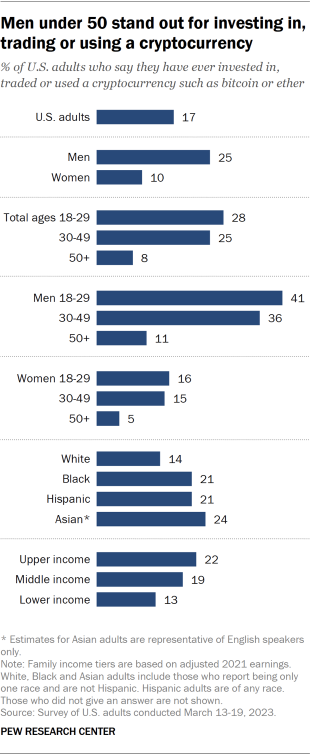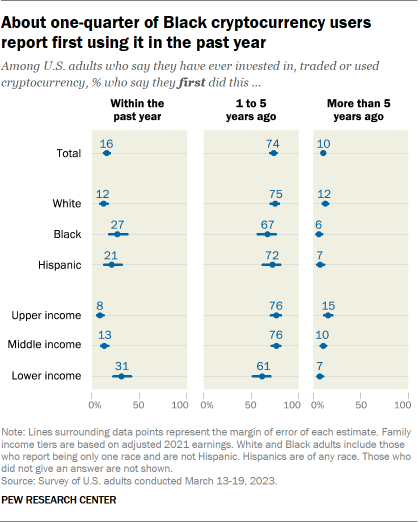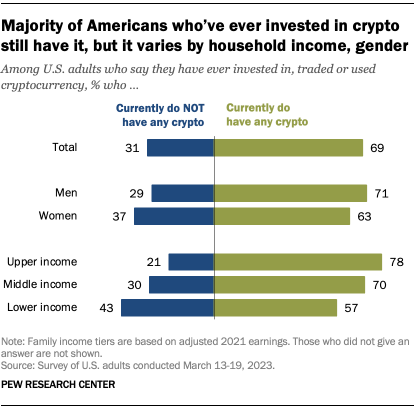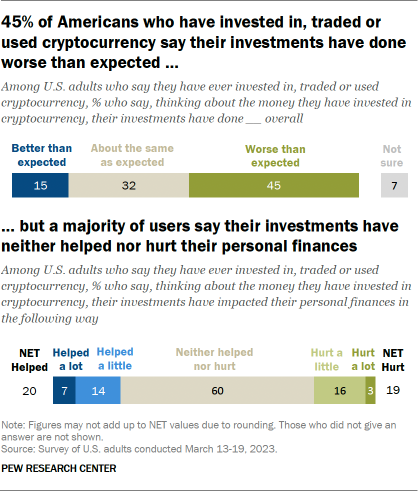Cryptocurrency markets are taking a beating from all sides – from declines in value to multiple corporate bankruptcies to lawsuits and regulatory threats. Among the vast majority of Americans who say they have heard at least a little about cryptocurrency (88%), three-quarters say they are not convinced that current ways of investing, trading or using cryptocurrencies are reliable and safe, according to a Pew Research Center survey conducted March 13-19. This affects about two-thirds of all American adults.

About four in ten adults who have heard of cryptocurrency (39%) say they are not at all confident and a further 36% are not very confident in the reliability and security of cryptocurrencies. At the other end of the spectrum, few of these adults are extremely (2%) or very (4%) confident in cryptocurrencies. About one in five respondents (18%) say they are quite confident.
While concern about cryptocurrency is broad, some groups of Americans are more concerned than others. For example, adults aged 50+ who have heard of cryptocurrency are more likely than their younger counterparts to say they don’t trust its reliability and security (85% vs. 66%). .
The Pew Research Center conducted this study to examine Americans’ opinions and personal experiences with cryptocurrency. This survey was conducted among 10,701 American adults from March 13-19, 2023. All of those who participated are members of the Pew Research Center’s American Trends Panel (ATP), an online survey panel recruited by sampling national random residential address. In this way, almost all American adults have a chance of being selected. The survey is weighted to be representative of the US adult population by gender, race, ethnicity, party affiliation, education and other categories. Learn more about the ATP methodology. Here are the questions used for this analysis, as well as the answers, and its methodology.
This survey includes a total sample of 375 Asian adults. The sample primarily includes English-speaking Asian Americans and therefore may not be representative of the entire Asian adult population. Despite this limitation, responses from Asian adults are incorporated into general population figures throughout this report.
Women are also slightly more skeptical about investing, trading, or using cryptocurrencies. Among Americans who have heard of cryptocurrency, 80% of women say they don’t trust it, compared to 71% of men.
Attitudes also differ depending on whether someone has invested in cryptocurrency or not. While one in five cryptocurrency users say they are extremely or very confident about its security and reliability, that share drops to 2% among those who know about cryptocurrency but have not invested. Yet many of those have Invested in cryptocurrency also have concerns about its security: 43% of this group say they are not very or not at all confident in it.
Who uses cryptocurrency in the United States?

Overall, 17% of American adults say they have ever invested, traded or used cryptocurrency. This share is virtually unchanged from previous Center surveys conducted in 2021 and 2022.
As was the case in previous surveys, younger men are more likely to use cryptocurrency than men 50+ and women of any age. For example, 41% of men aged 18-29 say they have ever invested, traded or used cryptocurrency, compared to 16% of women in the same age bracket.
Cryptocurrency usage also differs by race, ethnicity, and income level. Some 24% of Asian adults and 21% of Black or Hispanic adults say they have ever invested in or used cryptocurrency, compared to 14% of white adults.
About one in five adults with upper (22%) or middle (19%) incomes have ever invested, traded or used cryptocurrency, compared to 13% of those with lower incomes.
Few cryptocurrency users used it for the first time in the past year
The survey also asked Americans when they first used cryptocurrency. About three-quarters of those who have ever invested, traded or used a cryptocurrency (74%) say they first did so between one and five years ago. Much smaller proportions report having done so for the first time in the last year (16%) or more than five years ago (10%).

There are differences by race, ethnicity, and household income among new cryptocurrency investors. Black users (27%) are more likely than white users (12%) to say they first used cryptocurrency in the past year. About two in ten Hispanic users (21%) say the same. (There weren’t enough Asian American cryptocurrency users to break down into a separate analysis.) And about three in ten users from low-income households say they’ve invested in crypto for the first time. cryptocurrency over the past year, down from about one in ten. adults from middle-income or upper-income households.
Some former cryptocurrency users no longer have it today

About three in ten adults (31%) who have ever invested, traded or used cryptocurrency say they currently have no cryptocurrency. Still, a majority (69%) say they currently have a cryptocurrency.
Those living in low-income households (43%) are more likely than those in middle-income (30%) or higher (21%) households to have abandoned cryptocurrency. And women who have ever used cryptocurrency are more likely than men in this same group to say they currently have no currency (37% vs. 29%).
About one in five cryptocurrency users say investments have hurt their personal finances at least a little
A plurality of cryptocurrency users (45%) report that their investments have performed worse than expected, a result statistically unchanged since July 2022, when the Center last asked about it. By comparison, 15% say their investments did better than expected, 32% say they did about the same as expected, and 7% aren’t sure.

However, when it comes to the impact of these investments on users’ personal finances, three in five users (60%) say they have neither helped nor hurt. Roughly equal shares say these investments helped (20%) or hurt (19%) their finances. Only 7% say cryptocurrency has helped their finances a lot and 3% say it has hurt a lot.
College graduates (25%) and those with some college experience (20%) are more likely than those with a high school diploma or less (10%) to say that their cryptocurrency investments are hurting their personal finances.
Note: The following are the questions used for this analysis, together with the answers, and its methodology.

Michel Faverio is a research analyst specializing in internet and technology research at the Pew Research Center.

Olivia Sidoti is a Research Assistant specializing in Internet and Technology Research at the Pew Research Center.